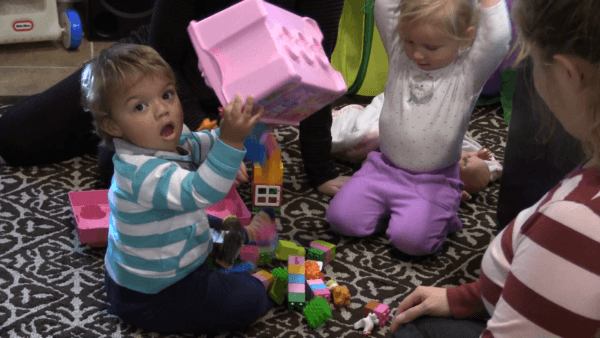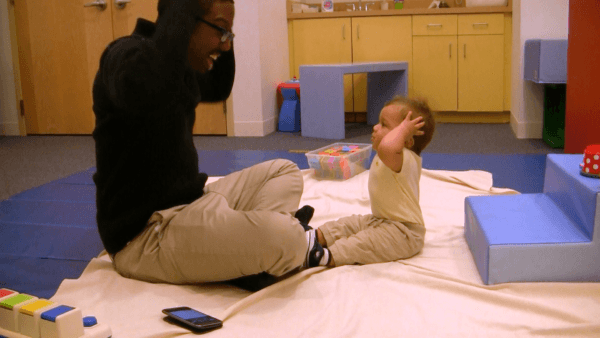New parents experience a lot of firsts with their baby! It can be overwhelming at times… Not to worry; Pathways.org is here to help! We try to make all this information a little easier to find and understand.
Our Parents’ Guide video series is designed specifically for busy parents, so each video is about a minute long. The videos cover important areas of child development including:
Communication
Executive Function
Feeding
Motor
Play
Sensory Integration
Social-Emotional
Tummy Time
And more helpful parenting tips!
All these areas of development are important for building skills your child will use throughout their whole life.

Teething isn’t fun for baby. You may notice an increase in fussing or crying, drooling, biting, and a loss of appetite around 3-12 months old, but there are ways to comfort them.

Did you know mirrors can help your baby learn? That’s right! The mirror in your bathroom right now can help your baby. In fact, mirrors are really fun toys for babies. Learn how they can help your child develop.

Screen are everywhere these days. Make the most of your child’s limited screen time with these tips.

Have you tried putting baby in side lying? The side lying position allows them to explore, move, and learn about their body. Plus, it’s great to help baby learn to roll over.

Winter Weather Safety for Baby
Help your baby brave the cold safely with these 6 easy tips.

Can’t find the time to workout with a new baby? Try these exercises that also help you bond with baby.

Make the most of early well-baby check-ups!

How much should baby be sleeping? Find the answer plus tips to them get quality shut eye.

Sleep is the foundation for healthy development. Did you know most children spend 40% of their childhood asleep?

It may seem like screens are the main way to play these days, but there are so many benefits to activities that don’t require screens!
Communication

Baby’s communication development starts long before they say their first word. Learn how and what parents can do to help develop communication skills.


Do you ever wonder what your baby is seeing? Find out what they can see by age as their vision develops.

Understand baby’s smile: when to expect it, how to encourage it, and what comes next!

Hearing and Listening Development
Did you know baby hears and listens to you? This can even help them develop. Learn skills they should have by age and tips to help your baby.

Kids are continuously learning about how sounds and language work. Here’s how you can get them interested in books and stories!
Executive Function

Developing Your Child’s Life Skills
Kids are asked, “What do you want to be when you grow up?” all the time. You can help your little one be what they want by developing their life skills!

Importance of Routines for Kids
See the benefits of routines and get tips for starting routines and sticking with them.
Feeding

Check out these signs to tell if baby is ready for solid foods, plus tips for making starting solids easier.

Did you know eating can help baby learn to talk? They both use the same muscles!

Saying goodbye to sippy cups can take some patience, but it’s worth it in the long run! Try no-spill cups with straws first, and then transition to open cups.

Is baby’s face messy? Baby having a face covered in food can be a good thing.

Learn signs of tongue tie and how it can impact baby’s feeding.

Answers to many common questions about burping your baby.
Motor

Every parent uses containers, such as carriers, car seats, bouncer seats, and strollers, on a daily basis, but did you know you can overuse them? Learn tips to reduce baby’s time in carriers.

Taking their first steps is an exciting milestone for baby! Use these tips to encourage walking.

Fine Versus Gross Motor Skills
The development of both fine and gross motor skills allow a child to explore the world. Different activities can help develop fine and gross motor muscles.

Positions that Help Baby’s Development
Baby needs to experience different positions during the day to be able to play and explore. Try putting baby in these positions during the day.

What is W-Sitting and Why It Matters
Have you noticed your child lies to w-sit with their knees bent and feet outside the hips? There are some risks to sitting like this. Watch for ways to encourage other sitting positions.

Has baby met this 4-6 month milestone?

Motor skills are important. Baby can develop these skills through their daily routine.

First steps? What about first stand? See tips to help baby learn to stand.
Play


Did you know baby’s age affects how they play peek-a-boo?! Learn how it the games changes as they grow?

Play can start as soon as baby is born! Smiling, making faces, and using different voices when talking to a newborn are all ways to play with baby.

Kids are with their siblings more than any other peer. Watch for the benefits and how to encourage siblings to play together.

Structured Vs Unstructured Play
What is the difference between structured and unstructured play? Find out and learn why it’s important for your child to have both.

Young children develop their social skills through the six stages of play, all of which are important for their development. All of the stages of play involve exploring, being creative, and having fun.

Get some fresh air while encouraging motor, sensory, and communication development by playing outside.
Sensory

Most people know 5 senses but there are 7! Proprioception (body awareness) and vestibular (balance and movement) are important for sensory development.

Baby uses touch to explore the world around them. Not only can you help baby develop their sense of touch, but you can also bond with baby.

Did you know that not only can baby smell, but smell can help develop their other senses?

Try these 7 tips to make diaper changes a positive experience for baby!

Do you know what your baby can see? Learn what baby can see during their first months of life.
Social-Emotional

Did you know the social-emotional skills your child will use in school and with friends can start being developed from the time they’re born.

How to Develop Social-Emotional Skills
Working on social-emotional skills can help your child make friends, resolve conflicts, and much more!
Tummy Time

Parents know to do Tummy Time with baby but do you know why it’s important? Learn why Tummy Time matters and tips for what to do if baby hates Tummy Time.

A strong core is essential for meeting milestones. See how you can help baby strengthen their core!

Baby Rolling Over During Tummy Time
Find out what to do if your baby keeping rolling over onto their back during Tummy Time.
